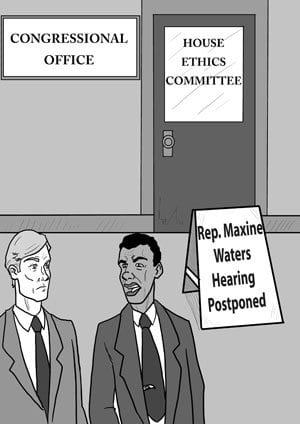
The case against Maxine Waters: A failure of common sense
| “Yea, they have to finish investigating the Ethics Committee first.” |
Those with wealth and political power enjoy special status in society. Americans understand this and accept it because there is a secret ambition in many of us that we will also one day enjoy those privileges. However, while Americans are ambitious and competitive, there is a cultural aversion to unfairness.
Sometimes a common sense analysis of the facts of a situation can determine whether the parties exceeded the limits of fair play. If that had been done, it is unlikely that Maxine Waters, a Democratic member of Congress from Los Angeles, would ever have been charged with ethics violations.
The gravamen of the case is that she improperly used her position to influence Henry Paulson, the former Secretary of the Treasury, to approve a TARP loan for OneUnited Bank when he otherwise would not have done so. Waters’ husband owns stock in the bank.
Anyone familiar with the career and character of Paulson knows that is highly unlikely. He joined Goldman Sachs in 1974 and rose to become CEO in 1998. That is one of the top posts on Wall Street. No one who understands the power pecking order would think that Paulson would fold under pressure from a member of Congress. In fact, he indicated in the investigation that Waters never even attempted to influence his judgment.
Now it is clear that the case was really about something else — dirty politics. Blake Chisam, the former staff director of the Ethics Committee, reported that Morgan Kim and Stacy Sovereign, two staff attorneys, had seriously violated Waters’ civil rights by divulging details of the investigation to others, all Republicans. As a result, the hearing has been postponed.
Since there is no evidence that Waters did more than arrange a meeting with Paulson for Bob Cooper, then chairman-elect of the National Bankers Association and senior counsel of OneUnited Bank, it is time to dismiss with prejudice the charges against her.
It is understandable that any financially beneficial arrangement for the family of a member of Congress might raise a question. However, little has been said about the fact that Congresswoman Michele Bachmann’s husband has received $137,000 in Medicaid funds for his firm Bachmann and Associates.
That is not to suggest that any federal laws have been violated. However, there is some evidence that his psychological counseling firm’s treatment to end homosexuality is ineffective. One wonders whether the looming congressional presence of Michele Bachmann has retarded efforts to suspend payments.
Great wealth can also tip the scales of fairness. Wall Street spent more than $251 million on lobbying last year to influence the legislation being drafted to reform the financial industry. It is all perfectly legal, but it dwarfs in scale the allegedly improper effort by Waters to help black banks survive the financial crisis. The financial clout of Wall Street funds elected officials and political parties. It can almost overpower efforts to assist the average citizen.
It takes common sense to determine whether conduct by the rich and powerful is egregious or whether it should be tolerated by society because of its benefits. Congressional involvement was certainly important to enable the minority banking system to thrive. Waters’ assistance certainly did not breech the bounds of propriety.






